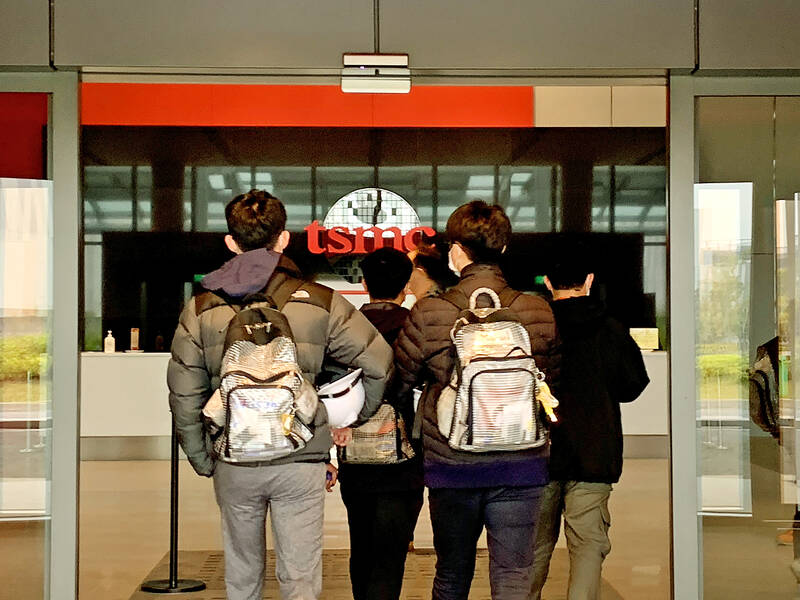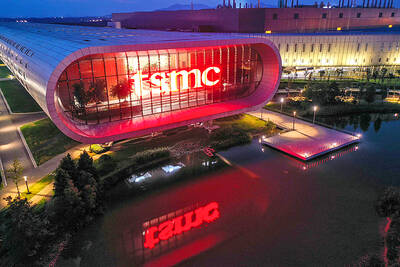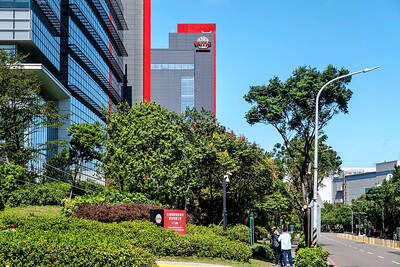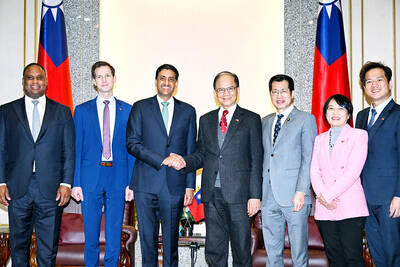Taiwan Semiconductor Manufacturing Co (TSMC, 台積電), the world’s largest contract chipmaker, took the top spot among patent applicants in the country for the seventh consecutive year last year, the Intellectual Property Office of the Ministry of Economic Affairs said on Friday.
TSMC last year filed 1,534 patent applications, down 21 percent from a year earlier, but remained the top applicant in Taiwan, the office said.
All of TSMC’s patent applications were invention patents, it added.

Photo: Grace Hung, Taipei Times
Patents are categorized into three groups by law — invention, utility model and design — with invention patents being the most important in the creation of new technical ideas.
Of foreign applications, US-based semiconductor equipment supplier Applied Materials Inc last year was Taiwan’s largest patent seeker, after filing 881 applications comprising 847 invention patents, two utility model patents and 32 design patents, the office said.
Applied Materials replaced smartphone IC designer Qualcomm Inc as the largest foreign patent applicant in Taiwan, the office said, adding that Qualcomm fell one spot to second place, with 763 applications, down 10 percent from a year earlier.
PC brand Acer Inc (宏碁) last year was second among local applicants with 530 patent applications, up 15 percent from a year earlier, ahead of flat panel maker AUO Corp (友達) with 505, up 7 percent.
Acer was also ahead of smartphone IC designer MediaTek Inc (聯發科) with 412 applications, up 58 percent, and DRAM chipmaker Nanya Technology Corp (南亞科技) with 371, up 28 percent.
Rounding out the top 10 local patent applicants were flat panel supplier Innolux Corp (群創) with 336 applications, up 2,700 percent; communication network IC designer Realtek Semiconductor Corp (瑞昱半導體) with 332, down 25 percent; government-sponsored Industrial Technology Research Institute with 331, down 18 percent; contract notebook computer maker Inventec Corp (英業達) with 289, up 24 percent; and China Steel Corp (中鋼) with 249, up 18 percent.
Intellectual Property Office Director Hong Shu-min (洪淑敏) said applications from Nanya Technology and Innolux hit 10-year highs.
Innolux’s impressive growth resulted from a relatively low comparison base a year earlier, as well as its efforts to develop Micro LED devices and precision medical equipment, Hong said.
Commenting on iPhone assembler Hon Hai Precision Industry Co (鴻海精密) not being among the top 10 local patent applicants for the second consecutive year, Hong said the company has changed its research-and-development strategies by assigning more of its efforts overseas.
Hon Hai, known globally as Foxconn Technology Group (富士康科技集團), focuses its research and development in the US and Japan, with each accounting for about 30 percent of patent applications, while China and Taiwan made up 20 percent and 10 percent respectively.
After Applied Materials and Qualcomm, South Korean Samsung Electronics Co last year took third spot among foreign patent applicants in Taiwan by filing 675 patents, up 30 percent from a year earlier, ahead of Japan-based semiconductor supplier Tokyo Electron Ltd with 487, up 2 percent, and Japanese electrical product maker Nitto Denko Corp with 445, down 16 percent, the office said.
Japanese memorychip supplier Kioxia Holdings Corp came in sixth with 436 applications, down 5 percent from a year earlier, followed by Facebook parent company Meta Platforms Inc with 293, up 281 percent; Japan’s Shin-Etsu Chemical Co with 275, up 35 percent; Japan’s Fujifilm Corp with 270, up 3 percent; and Japanese precision processing tool supplier Disco Corp with 266, up 18 percent, the office said.
Meta and Shin-Etsu Chemical were for the first time among the top 10 foreign patent applicants in Taiwan, with Meta benefiting from its efforts to develop technologies related to the metaverse, it said.
The top 10 foreign patent applicants were largely from the semiconductor, information technology and chemical industries, the office said.
A total of 72,059 patent applications last year were filed in Taiwan, down 0.8 percent, although invention patent applications bucked the downturn, rising 2 percent to a 10-year high of 50,242, the office said.
Among foreign applicants, Japan was the largest with 13,128 applications, ahead of the US with 8,517 and China with 4,424, it said.
Japan was the largest invention and design patent applicant, with China the largest utility model patent applicant last year, it added.

DOWNTURN FORECAST: Revenue grew to NT$200.05 billion last month, making it TSMC’s best January ever, but revenue could dip by up to 16 percent this quarter Taiwan Semiconductor Manufacturing Co (TSMC, 台積電) yesterday reported annual revenue growth of 16.2 percent to NT$200.05 billion (US$6.64 billion) last month, indicating that the world’s biggest contract chipmaker and a sole chip supplier for iPhones was unfazed by quarters-long supply chain inventor
Global index provider MSCI Inc has raised Taiwan’s weighting in one of its major indices, but left the country’s weighting in two others unchanged.MSCI yesterday said in a statement that following a quarterly review, it increased Taiwan’s weighting in the MSCI All-Country Asia ex-Japan Index by 0.03

QUICK REVERSAL: The move sent the chipmaker’s share price down 3.67 percent, after the billionaire investor’s company in October disclosed a major TSMC stake Warren Buffett slashed his holding of Taiwan Semiconductor Manufacturing Co (TSMC, 台積電) just months after disclosing a major stake, an unusually quick reversal by the billionaire investor that is chilling investor sentiment toward the chip giant.Buffett’s Berkshire Hathaway Inc cut its holding of TS

TSMC MEETING: The US lawmakers said the visit is not meant to provoke China, but to deepen cooperation in economic and political matters, as cross-party talks are planned The US and Taiwan should increase cooperation in manufacturing and innovation to benefit the world, a visiting US delegation said after meeting with Taiwan Semiconductor Manufacturing Co (TSMC, 台積電) founder Morris Chang (張忠謀) yesterday.US representatives Ro Khanna, Jake Auchincloss, Jonathan Jackson

‘SWASTICAR’: Tesla CEO Elon Musk’s close association with Donald Trump has prompted opponents to brand him a ‘Nazi’ and resulted in a dramatic drop in sales Demonstrators descended on Tesla Inc dealerships across the US, and in Europe and Canada on Saturday to protest company chief Elon Musk, who has amassed extraordinary power as a top adviser to US President Donald Trump. Waving signs with messages such as “Musk is stealing our money” and “Reclaim our country,” the protests largely took place peacefully following fiery episodes of vandalism on Tesla vehicles, dealerships and other facilities in recent weeks that US officials have denounced as terrorism. Hundreds rallied on Saturday outside the Tesla dealership in Manhattan. Some blasted Musk, the world’s richest man, while others demanded the shuttering of his

ADVERSARIES: The new list includes 11 entities in China and one in Taiwan, which is a local branch of Chinese cloud computing firm Inspur Group The US added dozens of entities to a trade blacklist on Tuesday, the US Department of Commerce said, in part to disrupt Beijing’s artificial intelligence (AI) and advanced computing capabilities. The action affects 80 entities from countries including China, the United Arab Emirates and Iran, with the commerce department citing their “activities contrary to US national security and foreign policy.” Those added to the “entity list” are restricted from obtaining US items and technologies without government authorization. “We will not allow adversaries to exploit American technology to bolster their own militaries and threaten American lives,” US Secretary of Commerce Howard Lutnick said. The entities

Minister of Finance Chuang Tsui-yun (莊翠雲) yesterday told lawmakers that she “would not speculate,” but a “response plan” has been prepared in case Taiwan is targeted by US President Donald Trump’s reciprocal tariffs, which are to be announced on Wednesday next week. The Trump administration, including US Secretary of the Treasury Scott Bessent, has said that much of the proposed reciprocal tariffs would focus on the 15 countries that have the highest trade surpluses with the US. Bessent has referred to those countries as the “dirty 15,” but has not named them. Last year, Taiwan’s US$73.9 billion trade surplus with the US

Prices of gasoline and diesel products at domestic gas stations are to fall NT$0.2 and NT$0.1 per liter respectively this week, even though international crude oil prices rose last week, CPC Corp, Taiwan (台灣中油) and Formosa Petrochemical Corp (台塑石化) said yesterday. International crude oil prices continued rising last week, as the US Energy Information Administration reported a larger-than-expected drop in US commercial crude oil inventories, CPC said in a statement. Based on the company’s floating oil price formula, the cost of crude oil rose 2.38 percent last week from a week earlier, it said. News that US President Donald Trump plans a “secondary